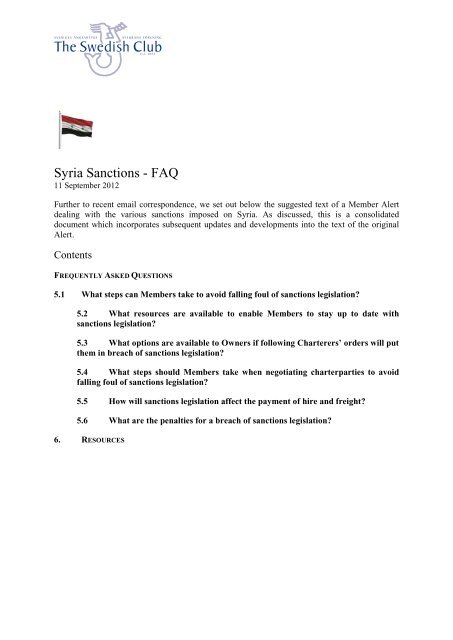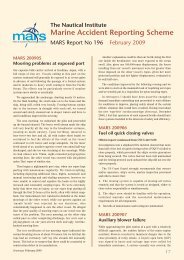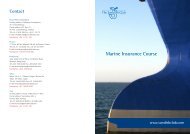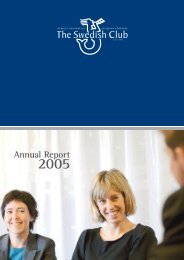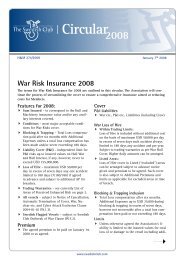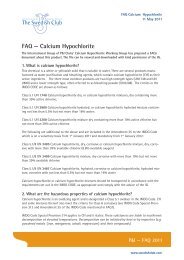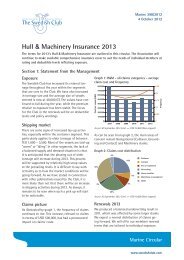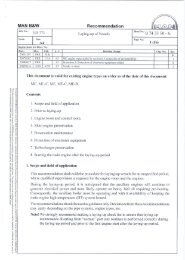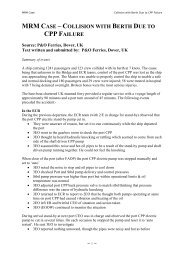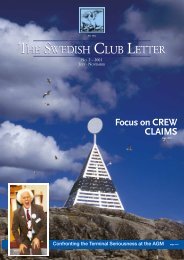Syria Sanctions - FAQ - The Swedish Club
Syria Sanctions - FAQ - The Swedish Club
Syria Sanctions - FAQ - The Swedish Club
Create successful ePaper yourself
Turn your PDF publications into a flip-book with our unique Google optimized e-Paper software.
<strong>Syria</strong> <strong>Sanctions</strong> - <strong>FAQ</strong>11 September 2012Further to recent email correspondence, we set out below the suggested text of a Member Alertdealing with the various sanctions imposed on <strong>Syria</strong>. As discussed, this is a consolidateddocument which incorporates subsequent updates and developments into the text of the originalAlert.ContentsFREQUENTLY ASKED QUESTIONS5.1 What steps can Members take to avoid falling foul of sanctions legislation?5.2 What resources are available to enable Members to stay up to date withsanctions legislation?5.3 What options are available to Owners if following Charterers’ orders will putthem in breach of sanctions legislation?5.4 What steps should Members take when negotiating charterparties to avoidfalling foul of sanctions legislation?5.5 How will sanctions legislation affect the payment of hire and freight?5.6 What are the penalties for a breach of sanctions legislation?6. RESOURCES
5. FREQUENTLY ASKED QUESTIONS5.1 What steps can Members take to avoid falling foul of sanctions legislation?It is essential that Members carry out thorough investigations where there is even a possibility thatinterests related to a country against which sanctions are in force may be involved in a transaction.In particular, it is essential that Members check the lists of designated persons andprohibited goods, which can be found by following the links in section 3.2 below. <strong>The</strong>se lists,particularly those listing designated persons, are subject to change on a regular basis. Anytransaction involving these persons and/or goods is likely to be prohibited by sanctionslegislation.<strong>The</strong> <strong>Club</strong> suggests that the following points, in particular, are considered:a) Identify all parties involved in the transaction. This may include vessels, Charterers,customers, suppliers, receivers, ultimate end users and financial institutions. Members shouldalso make themselves aware of any third parties or middlemen, as well as the ultimatebeneficial owner of the vessel/s in question and of all companies involved in the transaction.All of these parties must be investigated thoroughly.b) Identify the precise nature of the cargo to be transported, as well as the ultimate use to whichthe cargo will be put. Specific sanctions are in place in respect of so-called “dual use” goods,and so the latter point must be carefully investigated. <strong>The</strong> sanctions provisions in forcecontain extensive prohibitions in relation to certain listed goods. Pleading ignorance of this isunlikely to provide a defence to a breach of sanctions legislation.c) Regularly check the published lists of parties with whom trade is prohibited or restricted. <strong>The</strong>relevant websites are listed later on in this Alert.d) Ensure that all contracts, for example charterparties, are drafted to permit the refusal byOwners of orders that require trading with entities who are targeted by sanctions legislation,and permit a refusal of cargo which will put any party at a risk of a breach of sanctionslegislation.If in any doubt as to whether a particular contractual arrangement will result in a breach of anysanctions legislation, the <strong>Club</strong> recommends that Members seek legal advice.5.2 What resources are available to enable Members to stay up to date on sanctionslegislation?US Department of the Treasury Resource Centre for <strong>Syria</strong>n <strong>Sanctions</strong>:http://www.treasury.gov/resource-center/sanctions/Programs/pages/syria.aspxList of all EU Regulations:http://www.hm-treasury.gov.uk/fin_sanctions_syria.htmConsolidated list of EU financial sanctions targets:http://www.hm-treasury.gov.uk/d/syria.htm2
5.3 What options are available to Owners if following Charterers’ orders will put themin breach of sanctions legislation?Charterers may order a vessel to discharge goods which are prohibited by sanctions legislation, orwhich are to be supplied to a party on an asset freeze list. Owners may wish to refuse Charterers’orders, which may put Owners in breach of sanctions legislation. Such an arrangement may, forexample, require money to be paid to a party on an asset freeze list, or provide for the carriage ofgoods which are prohibited under one or more sanctions regimes. Whether Owners are entitled torefuse those orders is not straightforward.<strong>Sanctions</strong> are likely to impact on Charterers as well as Owners. A first step, therefore, could be tohighlight the risk that Charterers would face by ordering the vessel on such a voyage. This may besufficient to prompt a revision of the voyage orders.If, however, the original orders are restated (and there is no express exclusion in the charterpartypreventing Charterers from doing so), Owners would be left with a number of arguments. It maybe possible to argue that such an order should be considered illegal as the vessel is only permittedto carry lawful merchandise in lawful trades. Under English law a voyage order would be illegalnot only if it is contrary to English law but also, it is thought, if it is illegal under the law of thevessel’s flag state or the law of the “place of performance” of the charterparty. Looking at USsanctions for example, which may require the freezing of assets and funds, it could be argued thatif hire payments are routed through the US then the payment of hire is effectively prohibited byUS legislation.<strong>The</strong> <strong>Club</strong> recommends that Members seek legal advice if they are at all concerned about aparticular set of voyage orders.5.4 What steps should Members take when negotiating charterparties to avoid fallingfoul of sanctions legislation?Although it is impossible to guarantee protection at all times from all sanctions legislation, thereare some measures which Owners can take when negotiating new charterparties which will gosome way to protecting them.Firstly, should Owners wish to avoid calling at <strong>Syria</strong>n ports, the <strong>Club</strong> suggests that <strong>Syria</strong> beexcluded from the trading limits in the charterparty. In cases where <strong>Syria</strong>n ports are notspecifically excluded from the trading limits, Owners can also protect themselves byincorporating specific wording into the charter (and, where appropriate, the sub-charter) toprovide a mechanism to deal with a situation when orders are given by Charterers that wouldbreach sanctions legislation. BIMCO and Intertanko have both published a standard form ofwording for time charters, which can be found on their respective websites.<strong>The</strong> Intertanko clause has a broad scope and is generally drafted in favour of Owners, as all that isrequired for a trade to be deemed unlawful is that it “could” expose the “vessel, its Owners,Managers, crew or insurers” to a “risk” of sanctions. <strong>The</strong>re is, however, the possibility that partiescould disagree as to whether the “trade” in question could lead to such a risk. Owners may wish toexpressly amend the clause to provide that it is for Owners to decide, in their reasonablejudgment, whether such risks exist. Charterers, on the other hand, may wish to restrict the scopeof the clause to trade which “does”, in fact, expose Owners to risk.BIMCO states that the objective of its clause is to “provide owners with a means to assess and acton any voyage order issued by a time charterer which might expose the vessel to the risk of3
sanctions. <strong>The</strong> test is one of ‘reasonable judgment’ by the owners in determining whether the riskof the imposition of sanctions is tangible”.<strong>The</strong> <strong>Club</strong> strongly recommends that such a clause be included in new charterparties, althoughlegal advice should be obtained to ensure that the clause is in keeping with the other terms of thecharterparty in question. In particular, it should be noted that these clauses focus on the ability torefuse orders, and do not contain other necessary provisions such as indemnities.5.5 How will sanctions legislation affect the payment of hire and freight?<strong>The</strong> issue of both making payments and getting paid will be complicated by legislation limitingparties’ abilities both to deal with <strong>Syria</strong>n banks and to make funds available for the benefit oflisted parties. <strong>The</strong>re are certain derogations listed in the various sanctions legislation, whichpermit payments for the benefit of listed parties in specific circumstances where authorised by therelevant authorities. It must not be assumed, however, that a particular payment will fall withinsuch a derogation.If it is not possible to circumvent these problems by bringing the payment within one of thespecified derogations, it may be necessary to look for other ways of making and receivingpayment, for example via a source which is not a designated person or entity. However, cautionmust be exercised here. An attempt to circumvent the provisions of sanctions regimes may itselfamount to a breach. EU Regulation No. 36/2012 specifically prohibits “the participation,knowingly and intentionally, in activities the object or effect of which is, directly or indirectly, tocircumvent” certain of the measures specified in that Regulation.<strong>The</strong> <strong>Club</strong> recommends that Members contact it for advice, or seek independent legal advice,should they be at all concerned that a payment will be made for the benefit of a listed party.5.6 What are the penalties for a breach of sanctions legislation?European UnionEU Regulations are required to be implemented by way of national legislation in each MemberState. As such, the penalties for breach will vary from State to State. <strong>The</strong>y are, however, likely toinclude criminal convictions, fines and/or prison sentences.United States<strong>The</strong> US Government can impose both criminal and civil penalties for breach of the sanctionslegislation. As regards criminal penalties, these may include up to 10 years in prison, up toUS$500,000 in corporate fines and up to US$250,000 in individual fines. Civil penalties can alsobe imposed of up to US$11,000 per violation.4
6. RESOURCES<strong>The</strong> <strong>Syria</strong>n sanctions regimes are updated on a regular basis. It is therefore essential thatMembers regularly check the lists of designated individuals and entities, whose assets arefrozen and with whom it is prohibited to do business. <strong>The</strong> lists can be accessed via the linksbelow.US Department of the Treasury Resource Centre for <strong>Syria</strong>n <strong>Sanctions</strong>:http://www.treasury.gov/resource-center/sanctions/Programs/pages/syria.aspxList of all EU Regulations:http://www.hm-treasury.gov.uk/fin_sanctions_syria.htmConsolidated list of EU financial sanctions targets:http://www.hm-treasury.gov.uk/d/syria.htmDisclaimer: This Member Alert is intended to provide only general guidance and information pertaining tothe issues identified and commented upon herein. <strong>The</strong> content of this Alert is not intended to be, and shouldnot be treated as being final and binding legal advice. If Members consider they are likely to or in fact haveencountered problems or difficulties as discussed in this Alert, they are asked to contact the <strong>Club</strong> andobtain further legal advice relevant to their specific circumstances.5


